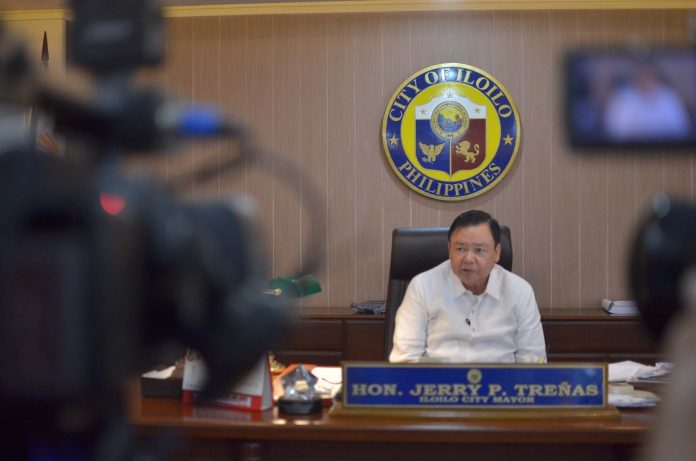
ILOILO City – Foreign vessels calling here must be quarantined, according to Mayor Jerry Treñas. He ordered the Bureau of Customs (BoC), the Department of Health’s Bureau of Quarantine (DOH-BoQ) and City Health Office (CHO) to enforce this preemptive measure against the novel coronavirus (2019-NCoV).
In Executive Order (EO) No. 033-2020 issued on Feb. 7 that called for “maximum” protection of Iloilo City, Treñas stressed the quarantine must be enforced regardless of the clearance that foreign vessels have secured from other ports.
A quarantine is a restriction on the movement of people and goods. It aims to prevent the spread of disease or pests. In the current context – the outbreak of 2019-nCoV, quarantine is preventing the movement of those who may have been exposed to the virus but do not have a confirmed medical diagnosis yet.
The EO did not state how long the quarantine period should be. But it further tasked BoC, BoQ and CHO to conduct inspection/examination, surveillance and issue clearance to foreign vessels calling on seaports of Iloilo City.
Also citing Republic Acts 9271 (Quarantine Act of 2004) and 11332 (Mandatory Reporting of Notifiable Diseases and Health Events of Public Health Concern Act), Treñas ordered the three bodies to require the crew and passengers of foreign vessels to accomplish the Health Declaration Checklist.
The Health Declaration Checklist is designed to help health authorities track down the health history of individuals.
Treñas’ EO made no distinction between foreign cargo vessels and foreign passenger ships in the enforcement of the quarantine.
Early this month, so as not to disrupt the international cargo supply chain, the Philippine Ports Authority (PPA) announced that the country’s ports remain open to all ships even from those originating from China and its special administrative regions (SARs) like Hong Kong and Macau.
The2019-nCoV originated in China, specifically in Wuhan City, Hubei province.
The only condition, according to PPA, is the non-disembarkation of vessel crew and no visitors allowed while docked in any PPA-controlled port or anchorage.
“We cannot afford to ban the entry of international ships to our shores in the midst of this 2019-nCoV scare as doing so will surely paralyze our supply chain. Most of our imports and exports go to the hub ports located in China and its SARs,” explained PPA general manager Jay Daniel Santiago.
QUARANTINE: HISTORY
The word “quarantine” originated from the Venetian dialect form of the Italian quaranta giorni, meaning “forty days”. This is due to the 40-day isolation of ships and people before entering the city-state of Ragusa (modern Dubrovnik, Croatia).
This was practiced as a measure of disease prevention related to the Black Death plague that, between 1348 and 1359, wiped out an estimated 30 percent of Europe’s population and a significant percentage of Asia’s population.
The original document from 1377, which is kept in the Archives of Dubrovnik, states that before entering the city, newcomers had to spend 30 days (a trentine) in a restricted place (originally nearby islands) waiting to see whether the symptoms of Black Death would develop.
In 1448, the Venetian Senate prolonged the waiting period to 40 days, thus giving birth to the term “quarantine”.
The 40-day quarantine proved to be an effective formula for handling outbreaks of the plague. According to current estimates, the bubonic plague had a 37-day period from infection to death; therefore, the European quarantines would have been highly successful in determining the health of crews from potential trading and supply ships.
However, Santiago reiterated that ships calling on the Philippines more than 14 days after leaving a port in China shall be allowed to dock without restrictions.
BRGY HEALTH TEAMS
Aside from the quarantine, Treñas’ EO also ordered barangay monitoring and reporting of “notifiable disease and health events of public health concern.”
The CHO, pursuant to RA 11332 and Department of Interior and Local Government (DILG) Memorandum Circular No. 2020-018, shall collaborate with barangay officials to organize and mobilize Barangay Health Emergency Response Teams (BHERTs), according to Treñas.
BHERTs shall be responsible for monitoring and recording returning residents and transients with history of travel from affected countries positive for 2019-nCov and similar strains and/or exhibiting symptoms such as fever, cough, and/or colds, and to report to the CHO if there is any.
The city mayor ordered tourism establishments (such as, but not limited to hotels, pension houses, motels, resort dwellings and transient accommodations) to conduct a similar monitoring.
“The CHO shall take charge of advising and orienting the tourism establishment owners on the implementation of this…,” the EO further read./PN



